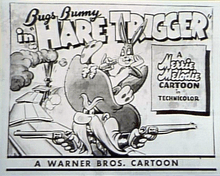Hare Trigger
| Hare Trigger | |
|---|---|
| Merrie Melodies (Bugs Bunny) series | |
 Lobby card | |
| Directed by | I. Freleng |
| Produced by | Edward Selzer |
| Story by | Michael Maltese |
| Voices by | Mel Blanc |
| Music by | Carl W. Stalling |
| Animation by |
Manuel Perez Ken Champin Virgil Ross Gerry Chiniquy Jack Bradbury (unc.) |
| Layouts by | Hawley Pratt |
| Backgrounds by | Paul Julian |
| Studio | Warner Bros. Cartoons |
| Distributed by |
Warner Bros. Pictures The Vitaphone Corporation |
| Release date(s) | May 5, 1945 (USA) |
| Color process | Technicolor |
| Running time | 8:00 |
| Language | English |
Hare Trigger is a 1945 Warner Brothers Merrie Melodies cartoon short starring Bugs Bunny directed by Friz Freleng. It marks the first appearance of Yosemite Sam, who appears as a train robber. Mel Blanc does both characters' voices.
The title is a play on "hair trigger", referring to any weapon or other device with a sensitive trigger.
This is the first cartoon with a shorter version of the Merrily We Roll Along music.
Plot
After opening credits underscored by a lively instrumental of "Cheyenne", an old-fashioned train is seen rolling along through the desert. It passes another train going around a utility pole, and voices are heard repeating "Bread and Butter".
Bugs is riding in the mail car of a train, singing a nonsense song called "Go Get the Axe", when a pint-sized bandit attempts to rob the train (with the underscore playing stereotypical "villain music"), only to have it pass clear over his head. He then calls for his horse, which he needs a rolling step-stair to mount. He catches up and boards the train and begins to rob it while the mail clerk wraps himself in a package marked DON'T OPEN 'TIL XMAS. The bandit accidentally throws Bugs Bunny in his sack. Bugs assumes he's Jesse James. The bandit scoffs and tells him (and the audience) who he actually is: "I'm Yosemite Sam, the meanest, toughest, rip-roarin'-est, Edward Everett Horton-est hombre what ever packed a six-shooter!" (This pattern of Sam introducing himself to Bugs and the audience would continue in other cartoons.) Bugs tells Sam that there is another tough guy in the train packing a "seven-shooter", and Sam goes looking for him – and he is actually Bugs in disguise.
Various fights ensue, as each character temporarily gets the upper hand for a while. After another skirmish, Bugs tricks Sam into dashing into a lounge car in which a horrific fight is occurring, actually stock film footage of a stereotypical western saloon fight, taken from the Warner Brothers western Dodge City. With the sounds of crashes and bangs in the background, Bugs calmly sings "Sweet Georgia Brown" to himself. Sam emerges tottering, banged and bruised, to a comical instrumental of "Rally 'Round the Flag", and a race-based gag occurs that is subtle enough it is usually left intact in network showings: Bugs effects the stereotyped voice of an African-American train porter, and has the dazed Sam convinced he's supposed to disembark the train, piling him up with luggage; Sam even hands Bugs a silver coin as a tip, and Bugs says, "Thank you, suh!" As Sam steps off the moving train, the mail-drop hook grabs him and temporarily whisks him off the train. Bugs thinks he has vanquished Sam, and yells "So long, screwy, see ya in Saint Louie!" in a line that will be echoed in Bugs Bunny Rides Again and A Feather in His Hare. But he gets back on board somehow.
Finally, Sam has Bugs tied up, dangling from a rope, weighted down by an anvil, and fiendishly cutting through the rope, while the train is passing over a gorge. The screen fills with the words the narrator (also Mel Blanc, in pretty much his natural voice) is saying, "Is this the end of Bugs Bunny? Will our hero be dashed to bits on the jagged rocks below?" and so on. Then Bugs walks across the screen, dressed in top hat and tails, carrying a bag full of gold (reward money), and dragging the tied-up villain behind him, mocking the on-screen words ("Is he to be doomed to utter destruction? Will he be rendered non compos mentis?"). Bugs closes by turning to the audience and repeating a popular radio catch-phrase from Red Skelton's "Mean Widdle Kid": "He don't know me vewy well, do he?" as a bar of Kingdom Coming plays on the track at iris-out.
See also
- Looney Tunes and Merrie Melodies filmography (1940–1949)
- List of Bugs Bunny cartoons
- List of Yosemite Sam cartoons
External links
- Hare Trigger at the Internet Movie Database
- Hare Trigger at the Big Cartoon DataBase
| Preceded by The Unruly Hare |
Bugs Bunny Cartoons 1945 |
Succeeded by Hare Conditioned |